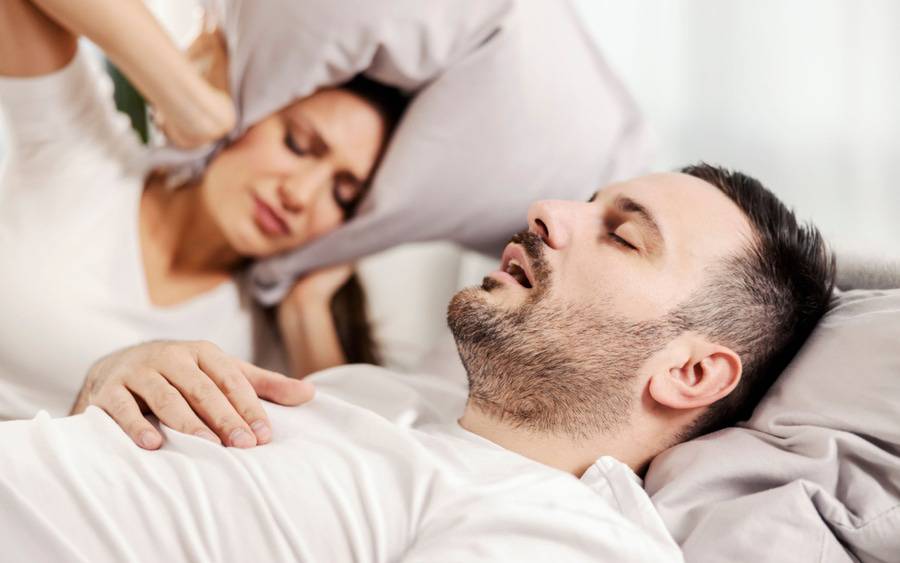How to Know if You Have Sleep Apnea
Learn the causes, symptoms and treatments

Learn the causes, symptoms and treatments
You wake up exhausted even after a full night’s sleep. Your bed partner didn’t get much sleep either due to your loud snoring. Could these be signs you have sleep apnea? How do you know if you have this sleep disorder?
Sleep apnea is a common but serious sleep disorder that causes pauses in your breathing while you sleep. Apnea is a Greek word meaning “without breath.”
People with sleep apnea are unable to get enough oxygen during sleep. Loud snoring is often punctuated by sudden gasps for breath and abrupt awakenings. “These pauses may happen a few times a night or it may happen hundreds of times, depending on the severity of the problem,” says Shazia Jamil, MD, a sleep specialist at Scripps Clinic.
Sleep apnea is not just about poor sleep. If left untreated, it can lead to serious health problems, such as heart disease, stroke or diabetes.
“If you think you or a loved one has sleep apnea, consult with your doctor. It is never too early or too late to address sleep disorders,” Dr. Jamil says. “Many of the damaging effects of sleep apnea can be addressed through diagnosis and treatment.”
Schedule an appointment with a sleep specialist or ask your primary care physician to refer you to one.
What are types of sleep apnea?
Sleep apnea comes in two main forms: obstructive sleep apnea and central sleep apnea.
What causes obstructive sleep apnea?
Obstructive sleep apnea is the most common type of sleep apnea. It is primarily caused by the relaxation of the muscles at the back of your throat. When this happens, the airway narrows or closes as you breathe in, and breathing is briefly cut off.
“Each time this happens, the brain signals the sleeper to wake up and breathe. This awakening is often so brief that you may not actually wake up and may not remember it,” Dr. Jamil says. “As you can imagine, sudden and repeated disruption throughout the night does not make for a good night’s sleep.”
What causes central sleep apnea?
Central sleep apnea is less common. It occurs when the brain fails to send the proper signals to your upper airway and respiratory muscles to breathe.
What are symptoms of sleep apnea?
The most common symptoms of obstructive and central sleep apneas include:
- Loud and frequent snoring, restless sleep
- Choking or gasping during sleep
- Abrupt awakenings followed by shortness of breath
- Frequent urination at night
- Dry mouth upon wakening
- Daytime drowsiness, fatigue, morning headaches, difficulty concentrating
- Irritability
What are risk factors for sleep apnea?
Factors that increase the risk of obstructive sleep apnea or OSA include:
- Obesity
- Family history of sleep apnea
- A naturally narrow airway
- Swollen tonsils or adenoids
- Chronic nasal congestion
- Smoking
- Use of alcohol, sedatives, narcotics
- Medical conditions (congestive heart failure, high blood pressure, type 2 diabetes, stroke, chronic lung conditions, Parkinson’s disease)
Being older and male are risk factors for both obstructive and central apnea.
Perimenopause and menopause are risk factors in women.
Risk factors for central sleep apnea or CSA include:
- Congestive heart failure
- Parkinson’s disease
- Using opioid medicines
- Previous stroke
- High altitudes
Children can have sleep apnea too. Enlarged tonsils are usually the cause.
Sleep apnea and heart disease
Repeated awakenings at night make it hard to get restorative sleep, leading to a state of constant fatigue. The sudden drops in blood oxygen levels increase blood pressure and strain the cardiovascular system, contributing to heart disease.
What are treatments for sleep apnea?
A sleep medicine specialist can diagnose the disorder using an in-lab sleep study or a home sleep apnea test.
“Depending on your medical history and the severity of the problem, treatments range from lifestyle changes to devices, to medication to surgery,” Dr. Jamil says.
The first-line treatment is often lifestyle changes, such as weight loss, quitting smoking and avoiding alcohol and sleeping pills. Changing your sleeping position to avoid laying on your back can also help.
For mild or moderate obstructive sleep apnea, oral appliance therapy can help. The appliance fits like a sports mouth guard or orthodontic retainer as you sleep. It prevents the airway from collapsing by holding the tongue or supporting the jaw in a forward position.
What is a sleep apnea machine?
If first-line treatments do not provide relief, your doctor may recommend using a continuous positive airway pressure (CPAP) machine.
This device gently blows air into your airway to keep it open while you sleep. It includes a mask that you wear over your nose and/or mouth. The machine provides a steady stream of air to keep your airways open while you sleep.
“A CPAP machine can significantly reduce the common symptoms of sleep apnea like fatigue and daytime sleepiness,” Dr. Jamil says.
When is surgery an option for sleep apnea?
Surgery is often a last resort when other treatments have not worked. Options include:
- Removing or shrinking excess tissue in the throat
- Repositioning the jaw
- Inserting a nerve stimulator that activates the muscles that keep the airway open